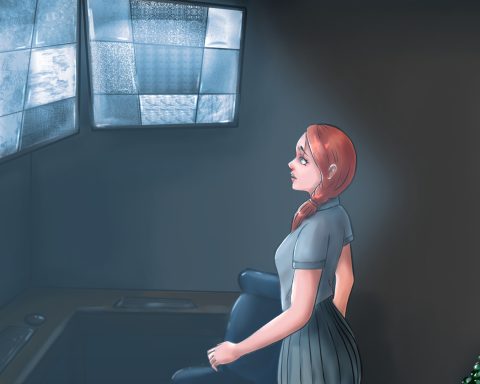I just want to start this review to just clarify something for future PR people, writing the descriptions of the games that they’re working on: “misery” and “mature” are two very different things. Disciples: Liberation claims that it’s a “dark, mature RPG”, but, no. It’s certainly “dark,” though it comes off as quite the juvenile effort at it. More to the point, though, it’s just miserable. It starts off strongly, with a world that could have been compelling and characters that could have been interesting, but the lack of nuance in how this one handles its more grim qualities really drags down on the overall experience.
It starts off strongly enough. You are cast in the role of the leader of a small band of mercenaries (“small” meaning… two) who are set on the task of assassinating some priest-dude. That’s always a mission I’m up for in my RPGs. Completely predictably, the mission takes a turn for the worse in the most life-threatening way, before your little team is saved from certain death at the last minute as a portal opens up, depositing you into a long-forgotten city in the clouds. A city that you are somehow, now, the ruler of. From there you recruit a bunch of soldiers from any of four factions, and the plot starts in full. You are then challenged to balance your relationship with four different factions as you make your way through a truly mammoth epic.
The developers claim that it’ll take around 80 hours to play through Disciples… and if anything I think they’re understating the actual length that this game runs from. Furthermore, there are multiple endings just in case one playthrough wasn’t enough. You can speed the process up a little through the auto-battle option, but even if you auto-resolve every battle that you can, you’re still looking at dozens upon dozens of hours of content to wade through, because you can finally enjoy the relief that reaching the end of the narrative brings.
Disciples is a really good example of a game that is padded out for no reason other than to prolong itself. The central narrative is standard grim western stuff, and while it has a large roster of characters and, yes, branching narratives, it really struggles to tell a compelling story, either at a micro or macro level. At the micro level, the game is filled with little side stories and quests, but they are all pretty standard genre stuff, and generally involve miserable people doing miserable things to one another. Whether it’s the righteous priests that “purify” people by carving them up (no, really), or xenophobic elves (that old trope), sinister undead (never saw that coming), or whatever else, Disciples isn’t going to expand your understanding of the range of what is possible within western fantasy.
Meanwhile, because it is so bloated, so overwrought, and so filled with useless little side tracks, the main narrative is paced horribly and is absolutely not worth the 80-hour run-time. To be clear, some long RPGs are. Both Pathfinder efforts have been incredibly long but found ways of maintaining the player’s interest. Dragon Age Origins was another brilliant example. The Witcher 3 and Skyrim highlight how side-story heavy narratives can be compelling over long periods of time thanks to quality quest design and writing. A long, meaty game that you can lose yourself within for hours at a time is a worthwhile experience, but with Disciples, all I wanted was to take a break from it every time I sat down to actually play it.
Part of the problem is that it is just so unrelenting… and this is an issue that I find increasingly grating about too much modern western fantasy. It’s like every storyteller has taken Lord of the Rings and then said to themselves “what if absolutely every person and person was just irredeemable?” As a result, with western fantasy these days, every scenario and situation seems to be a decision between “bad, and bad in a different way.” I blame George R. R. Martin for a lot of this, but Disciples is a particularly egregious example of it and while, yes, there were critical choices that I did need to stop and think about at times, there was no positivity or potential for joy in what I was doing. I was simply deciding which miserable mob was going to be able to make everyone around them even more miserable thanks to my direct support.
What saves Disciples, somewhat, is the combat system, which is a turn-based, grid-based skirmish thing, not unlike King’s Bounty II, which released just a few months ago (which, incidentally, is far more B-grade in terms of production values, but has a much better personality, too). You’re limited in how many units you can put into the field of battle, and you do end up with a wide range of different heroes and units, so forming the ideal party is a big part of the learning curve. As an added element – and this is something that I really appreciated, you could actually place up to three characters in the “back row” as a support element. There, they won’t directly participate in the battle, but will contribute either passive bonuses to your team, or launch an automated, additional attack on the opponents once every turn. Having the right “support” troops can mean all the difference in Disciples, and I found myself carefully tweaking my parties and strategies as the game pressed on and I got more units to test on both the front and back lines.
The battlefields themselves are quite small, so there’s not much room for movement tactics, however the various ways that characters can boost the abilities of one another, and the general difficulty with whittling down the enemy’s health means that you do need to be thinking about your every move. In addition to being able to take more than a few hits, most enemy squads have healers, and every character can heal themselves by sacrificing actions in combat, so battles can be strung-out affairs, but even if the AI is a little too dense for its own good, these battles rarely stop being engaging. They’re standard, if you’ve played enough fantasy RPGs over the years, but in this case it works, and is even a positive bit of nostalgia the hearkens back to the likes of Heroes of Might & Magic, from way back when.
Speaking of, when not in combat, the game world behaves not unlike a Heroes of Might & Magic title. You run around a series of large regions, “liberating” sources of resources from one enemy mob or another, and then using those resources back in the base to slowly construct and “level up” buildings (which will eventually give you access to better units to recruit and equipment to refine). This town “hub” is a little superficial, and it’s really little more than a glorified menu, but there is nonetheless a solid sense of progression as your army becomes more vibrant and you’ve got more to manage. It also encourages a lot of experimentation, which is a nice touch, giving you the ability to construct and deconstruct at will, when you want to test out what specific combinations of buildings can do for your “on-the-ground” strategy.
As interesting and tactical as that combat system is, I couldn’t get past the fact that Disciples: Liberation was asking 80 (or more) hours of a person’s time with so little payoff. I just found the whole thing too relentlessly miserable to connect with. It’s possible to create a dark setting and still have moments of warmth, beauty and joy. Tolkien understood that. Perhaps those that have been inspired by him should be more diligent students.
– Matt S.











